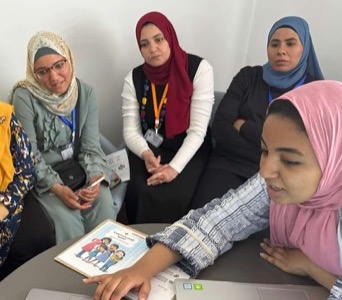We empower women within the Middle East with resources to fight period poverty.
Menstruation is a topic that unites all women regardless of their ethnicity or economic status; therefore, we see this intervention as a way to break barriers by bringing women, girls, and their communities together around a common struggle.
We take a holistic approach that focuses on girls/women, including their communities such as their family, educational institutions, social groups, and religious leaders.


They are participatory, interactive and practical. The focus is on explaining the menstrual cycle, illustrating what is happening to our bodies, explaining a normal period and when to seek medical advice. Options are then presented for managing one’s period using different products.
The importance of maintaining good health and hygiene and how to care for your body are also highlighted.
Breaking the stigma around this topic and normalizing it as a beautiful, normal, and healthy part of our bodies, is an important aspect of this training.
These are reusable, sustainable, low-cost cloth pads that can be used as an alternative to disposable products (i.e. Always).
The purpose is to better manage one’s hygiene while staying fresh and clean throughout the menstrual cycle. This reduces financial and social barriers that keep girls home during their period, and provides a sustainable solution.
These Dignity Kits upcycle pre-consumer textile waste (from ready-made garment factories) so that excess fabric can be repurposed into a reusable product to tackle poverty, reduce environmental impact, and empower women and girls to continue to go to school and work during their periods.
Workshops target 25-30 women per event and are conducted by VeraEgypt Master Trainers from the local communities.
Workshops are 2-4 hours in length and are hosted in partnership with local community organizers that bring the women together.
Workshops are interactive, providing training tools, practical games, exercises, discussions while developing community.
Sharing learnings is key through the use of different tools and resources that are made available such as products, pamphlets, booklets, website, and social media channels.
These foster peer learning and influencing so that participants can share what they have learned with their daughters and peers.
Dignity Kits are intentionally unassembled, so that at the end of the workshop, women get to choose the colours, patterns, and configuration of their personalized Dignity Kit (providing choice, as opposed to standardized hand-outs is a form of dignity in itself).
Dignity Kits are distributed in the context of the training workshops only, as education is required to sensitize women to this solution and how to use the product.
Surveys are conducted during the workshop as a needs assessment and follow-up surveys later to measure adoption rates.
